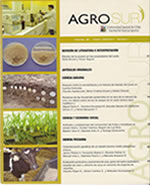Seasonal responses of C and N related soil conditions in a fire affected Mediterranean Chilean forest following organic amendments and plant establishment
Main Article Content
Abstract
Understanding how soil chemical/physical and biological parameters behave after the increasingly common fires in Mediterranean Chilean ecosystems is critical to boost their recovery. Incorporating organic amendments in soil to support its post-fire recovery is promising; however, there are important gaps regarding the seasonal responses of soil parameters following such additions. This study aimed to identify the effects of different organic amendments (compost, poultry, and swine manure) and methods of plant establishment (sowing or plantation), through the seasons observed in a sclerophyll Mediterranean Chilean forest over one year. Season over organic amendments and plant establishment method had a very strong effect on most of the twelve soil parameters evaluated. Across seasons, soil pH, electrical conductivity, water content, and aggregate stability were less variable than C and N pools, colony forming units (CFUs) of heterotrophic and free-living N2 fixing microorganisms, and urease and ammonia monooxygenase activities. Manure-based amendments increased NO3 and heterotrophic CFUs during fall and summer, respectively. The use of compost resulted in greater soil organic matter and carbon, mostly in summer. Different responses of soil abiotic and biotic properties after fire and organic amendments can likely influence differently processes related to ecosystem recovery, particularly those related to C and N cycles.

